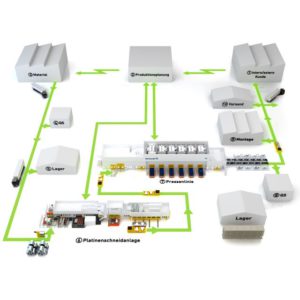Many operators have already wished that their system could tell them exactly what the problem is. In the age of the Industrial Internet, machines that communicate are no longer something to aspire to in the future. At the EuroBLECH trade fair Schuler’s “Smart Press Shop” concept will be demonstrating how networking solutions in forming technology can increase not only process reliability, but also cost-effectiveness in production
Networked systems increase process reliability and cost-effectiveness
Many operators have already wished that their system could tell them exactly what the problem is. In the age of the Industrial Internet, machines that communicate are no longer something to aspire to in the future. At the EuroBLECH trade fair Schuler’s “Smart Press Shop” concept will be demonstrating how networking solutions in forming technology can increase not only process reliability, but also cost-effectiveness in production.
The necessary interfaces are already available
In a modern servo press line from Schuler, around 30 industrial PCs are networked with one another. This is the only way to ensure a high level of productivity and safe part transport from one press station to the next. Single presses, laser blanking lines, and various automation components also already have the necessary interfaces for comprehensive networking. What is the maximum speed at which a specific sheet metal can be formed? Forming simulation provides valuable information for the virtual optimization of the entire system. To stay with the example of a servo press line: long before the tool sets are clamped into place, the virtual model of the system produces one part after another.
Optimization based on simulation
By simulating the entire system, including all press stages and automation components, the time needed for part transport is minimized. Schuler offers tools for optimizing output, helping to reduce the time required for commissioning considerably. The customer can also get information on the energy required for production. The systems provide data measured by sensors installed at numerous points, for example to monitor the press force. By drawing the right conclusions from this information, this area also has huge potential. If the press force progression deviates from a particular pattern, this indicates irregularities in the process. These solutions gather important information that can be used to maintain the line, thereby preventing damage to the machine and tool. If it becomes apparent that not everything is running smoothly, the service engineer can connect to the customer’s system online. In nine out of ten cases, problems can already be solved remotely through the Schuler Remote Service. Condition-based maintenance can therefore help save a lot of money. Many of these examples are already common practice at Schuler.
Hall 27, Stand F82




